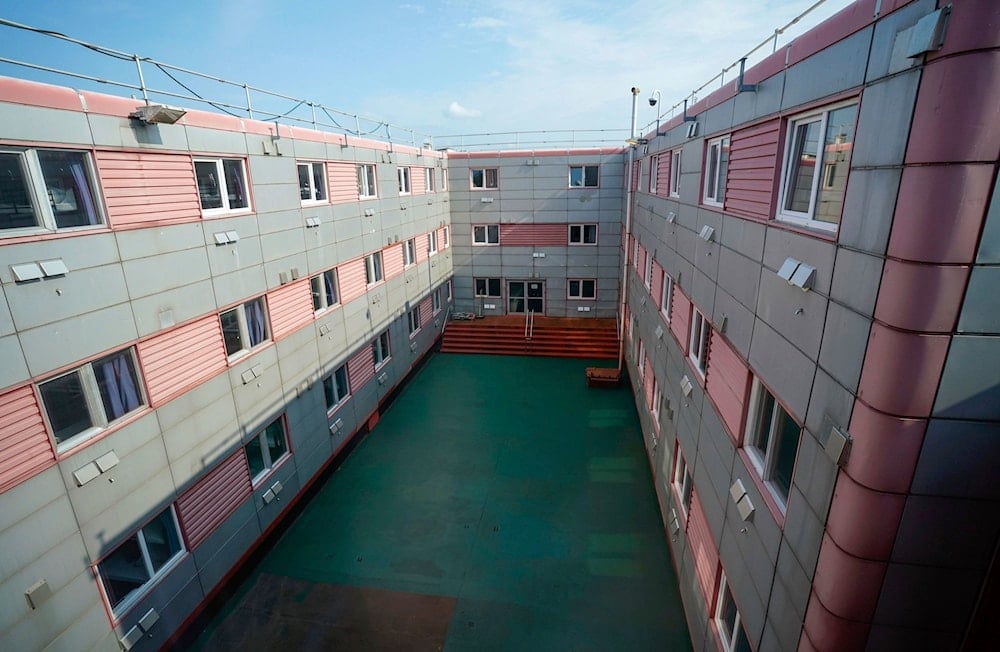Record number of asylum seekers died in UK Home Office housing in 2024
In 2024, 51 individuals died in Home Office-provided accommodation—11 more than the previous year and a more than twelvefold increase from 2019, when only four deaths were recorded.
-

Courtyard for fitness equipment on the Bibby Stockholm asylum barge, which will house over 500 immigrants, on July 21, 2023 (AP)
A record number of asylum seekers died last year while under the care of the UK Home Office, according to data obtained by The Guardian, with officials admitting they are unaware of the exact timing of some deaths.
In 2024, 51 individuals died in Home Office-provided accommodation—11 more than the previous year and a more than twelvefold increase from 2019, when only four deaths were recorded.
Initially, in response to Freedom of Information (FoI) requests, the Home Office reported that 30 asylum seekers had died during the year. However, it later had to issue an apology after it was revealed that the actual number was 21 higher.
The Home Office’s FoI team acknowledged the inaccuracy, with an official stating, “It has been brought to our attention that the information provided … contained incomplete data. I would like to apologise for this error.”
Deborah Coles, director of the charity Inquest, which supports families who have lost loved ones in state care, condemned the situation, saying, "There is a shocking lack of scrutiny and accountability from the Home Office and a complete disregard for the lives of this vulnerable group."
"Whether the incorrect data issued by the Home Office freedom of information team is deliberate concealment or incompetence, it shows a shocking disregard for the extremely vulnerable people who died.”
While some deaths were attributed to illness or old age, others are believed to have resulted from suicide. Charities have raised concerns that the treatment of asylum seekers in the UK has negatively impacted the health of an already vulnerable population.
Unlike the UK Ministry of Justice, which publishes data on prisoner deaths, the Home Office does not release statistics on migrant deaths in its care. Human rights and refugee organizations have called for greater transparency, urging the Home Office to do so. The cross-party Home Affairs Select Committee is currently investigating government-provided asylum accommodation, and the charity Asylum Matters has urged the inquiry to address concerns over the lack of disclosure regarding these deaths.
Of the initially reported 30 deaths, nearly a third—nine—were suspected suicides, while a similar number were classified as having an unknown cause, which could also include suicide. Only eight were definitively attributed to illness or natural causes.
Twelve of the deceased were in their teens, 20s, or 30s, while for 11 individuals, the exact date of death was listed as unknown. The Home Office did not comment on whether there had been delays in discovering the bodies of these individuals.
According to previously disclosed FoI data, deaths of asylum seekers have surged more than twelvefold in the past five years, from just four in 2019, during a period when asylum applications have more than doubled.
Maddie Harris, of the advocacy group Humans for Rights Network, called for greater transparency, stating, “The Home Office must urgently clarify precisely how many people have died whilst in the asylum system and under its care. This information should be proactively released as opposed to the current situation, which is completely devoid of transparency.”
Home Office sources stated that these deaths are routinely investigated by statutory partners, including the police and coroner, to determine the circumstances. Officials also noted that service providers are expected to conduct regular welfare checks and report any concerns to the relevant authorities.
The UK and asylum seekers
As of March 2024, over 4,000 asylum seekers arrived in the UK from across the English Channel on small boats, and by 2024, this number rose to reach 25,000 with 800 of them arriving in British lands in a single day.
The British parliament approved a bill in 2024 that would deport those refugees to Rwanda, in a controversial move that drew criticism from the United Nations who said the bill violates international law and puts the lives of those refugees at risk.
Violent riots broke out in August of 2024 as far-right hooligans attacked hotels that housed migrants, set cars on fire, and destroyed many buildings, following a stabbing incident that killed two children. The attack was the center of a misinformation campaign that said the assailant was a Muslim immigrant.
Elon Musk, billionaire and owner of X, shared a fake screenshot of a fake The Telegraph article claiming that PM Kier Starmer was planning to send far-right rioters to detainment camps in the Falklands. Musk faced a lot of backlash for meddling in UK affairs.
Just Elon Musk quote tweeting the co-leader of far-right party, Britain First, who is sharing a fake Telegraph headline
— Josh Self (@Josh_Self_) August 8, 2024
Seen by almost 1 million people in 15 minutes
Utterly dystopian pic.twitter.com/4W5ZOssbEY

 5 Min Read
5 Min Read








